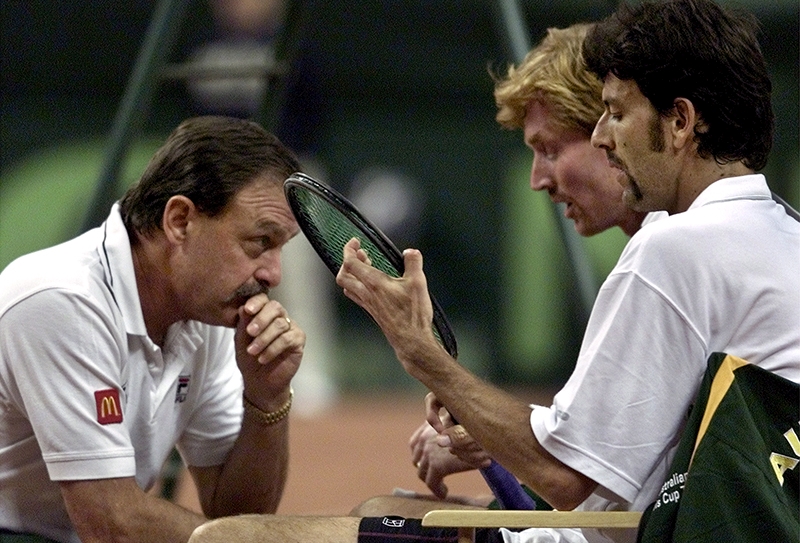Perfectionism: too much of a good thing?

Adam Nicholls explains the upsides and downsides of perfectionism in sport, and how to manage perfectionism to maximise performance
To be successful in life (and in sport), you have to care about what you are doing and strive to be the best that you can. This implies a degree of perfectionism. According to researchers, perfectionism refers to an aspect of personality in which an athlete has an extremely rigid and unflappable commitment to attaining high standards of performanceCog Therapy Res, 5, 449-468, 1990. In addition, the athlete will be highly critical of himself or herself.
Perfectionism types Researchers from the University of British Columbia identified two main types of perfectionism, which are referred to as self-oriented and socially prescribed perfectionismJ Pers Soc Psychol, 60, 456-470, 1991:
- Self-oriented perfectionism — Self-oriented perfectionism relates to an athlete’s self-imposed tendencies to attain high standards of performance, upon which the athlete evaluates himself or herself. Within this type of perfectionism, striving towards such high standards and the importance of the athlete perceiving him or herself as perfect are important. This is a positive attribute to have.
- Socially prescribed perfectionism — This type of perfectionism refers to athletes who perceive that others (ie coach, parents or peers) are exerting pressure for them to be perfect. If an athlete scores highly on this element of perfectionism, he or she will believe that incredibly high standards of performance must be achieved to feel valued by these significant others. Athletes who score highly on this dimension of perfectionism feel pressured to work towards achieving incredibly difficult goals to please others and to attain high standards of excellence. This can be a negative attribute to possess (see figure 1).
Figure 1: The negative effects of socially prescribed perfectionism

Anxiety - Athletes who display some of the characteristics of socially prescribed perfectionism (ie. setting incredibly high goals, self-criticism, and feeling pressure from others to perform to a high standard) are likely to experience worryAdvances in Motivation in Sport and Exercise. Champaign, IL: Human Kinetics, 2012. Researchers have found that athletes who score highly on overall perfectionism are more likely to be anxiousInt J Sport Exerc Psychol, 4, 7-24, 2006.
Anger - Researchers from the University of Alberta examined the relationship between perfectionism and anger among a sample of soccer players from CanadaJ Sport Exer Psych, 13, 323-335, 1991. They found that when the players had high personal standards, concerns about making mistakes, and pressure from a coach resulted in the players experiencing anger, without undue provocation and feelings of frustration.
Self-esteem - Researchers found that athletes who were perfectionists were more likely to experience low levels of confidence in their abilities to be successfulJ Sport Exer Psych, 13, 323-335, 1991. Furthermore, these athletes with low self-esteem and high perfectionism tendencies were more likely to be dissatisfied with their performance.
Burnout – The term burnout refers to psychological and physical exhaustion, reduced sport performance, and a loss of interest in sport, which occurs as a result of excessive training and insufficient recovery. There is a relationship between perfectionism (particularly socially-prescribed perfectionism) and athlete burnout, according to researchers from the University of LeedsPsych Sport Exerc, 9, 630-644, 2008 – probably because athletes feel compelled to train excessively.
What type are you?
Understanding whether you have any perfectionist tendencies is the key to managing them, and not letting such tendencies have a negative impact on your life or sport. Answer the following questions in the questionnaire below as honestly as you can. Your answers to these questions will give you an indication of whether you are a perfectionist or not:
Questionnaire Perfectionism in sport
| This survey is interested in your level of perfectionism. Please indicate your response by placing a CIRCLE around the appropriate number. Please answer these items carefully, thinking about how you are GENERALLY. There are no right or wrong answers. | #colspan# | Strongly disagree | Disagree | Neither agree nor disagree | Agree | Strongly agree |
|---|---|---|---|---|---|---|
| 1 | My coach’s standards are very important to me | 1 | 2 | 3 | 4 | 5 |
| 2 | I always set myself incredibly hard goals | 1 | 2 | 3 | 4 | 5 |
| 3 | When I was a child, I was often told off by my parents for doing things less than perfectly | 1 | 2 | 3 | 4 | 5 |
| 4 | If I fail to set high enough goals for my sport, I am going to be a much poorer athlete | 1 | 2 | 3 | 4 | 5 |
| 5 | My parents have never made any effort to understand my mistakes and why I have made them | 1 | 2 | 3 | 4 | 5 |
| 6 | I will be very upset with myself if I make an error during either training or competing | 1 | 2 | 3 | 4 | 5 |
| 7 | My parents have always wanted me to be better than everyone else at everything | 1 | 2 | 3 | 4 | 5 |
| 8 | Coming second is just as bad as coming last – it is still a failure | 1 | 2 | 3 | 4 | 5 |
| 9 | If someone else did better than me in a competition, I felt like I failed | 1 | 2 | 3 | 4 | 5 |
| 10 | Other athletes seem to accept lower standards than I do of myself | 1 | 2 | 3 | 4 | 5 |
| 11 | I hate not being the best during sport or training for sport | 1 | 2 | 3 | 4 | 5 |
| 12 | Training can often take me longer than other athletes because I spend so long repeating different elements | 1 | 2 | 3 | 4 | 5 |
| 13 | My coaches have always expected that I should be excellent | 1 | 2 | 3 | 4 | 5 |
| 14 | It is very important that my training sessions are well organised | 1 | 2 | 3 | 4 | 5 |
| 15 | My coaches and parents will think less highly of me if I perform poorly in competitions | 1 | 2 | 3 | 4 | 5 |
| 16 | I try to be as organised as I possibly can so I can arrive on time for everything | 1 | 2 | 3 | 4 | 5 |
| 17 | If I don’t do as well as my competitors in sport, it means that I am less of a person than them | 1 | 2 | 3 | 4 | 5 |
| 18 | It is incredibly important to me that I am good at every aspect of my sport | 1 | 2 | 3 | 4 | 5 |
SCORING THE QUESTIONNAIRE
The questionnaire that you have just completed is designed to measure two types of perfectionism: self-oriented perfectionism and socially prescribed perfectionism. Tallying up your score for questions 1, 3, 5, 7, 9, 11, 13, 15, and 17 will reveal you socially prescribed perfectionism score. Sum up your total score for questions 2, 4, 6, 8, 10, 12, 14, 16, and 18 which will give you your total score for self-oriented perfectionism.
INTERPRETING YOUR SCORE
The scores you received for socially prescribed perfectionism and self-oriented perfectionism will range from 9 to 45:
*Non-perfectionist profile: Scoring less than 20 on both subscales If you scored less than 20 for socially prescribed perfectionism and self-oriented perfection, it means that you feel little pressure from your coach or peers to perform to a high standard in your sport. You do not set incredibly hard goals nor punish yourself if you don’t achieve your goals.
*Pure socially prescribed perfectionist: Scoring 25 or higher for socially prescribed perfectionism, but lower than 15 for self-oriented perfectionism If you scored 25 or higher for socially prescribed perfectionism, but less than 15 for self-oriented perfectionism, you would be classified as having a pure socially prescribed perfectionism profile, which means that you feel immense pressure from the people who are close by you to attain high levels of performance.
*Pure self-oriented perfectionist: Scoring 25 or higher for self-oriented perfectionism, but lower than 15 for socially prescribed perfectionism If you scored 25 or higher for self-oriented perfectionism, but less than 15 for socially prescribed perfectionism, you would be classified as having a pure self-oriented perfectionism profile. This means that you set incredibly high goals and you work tirelessly to achieve these goals. You are motivated to achieve these goals for your own satisfaction rather than for the sake of others and what they might think.
*Mixed perfectionist: Scoring higher than 21 on both socially prescribed and self-oriented perfectionism If you scored 21 or more for socially prescribed perfectionism and self-oriented perfection, it means that you would be classified as being a mixed perfectionist. That is, you feel pressure from your coach or peers to perform to a high standard in your sport, and you also set yourself incredibly hard goals and punish yourself if you don’t achieve these goals.
CASE STUDY: Christopher Bergland (the positive side of perfectionismPsych Today, Aug 22, 2015)

Christopher Bergland is an elite endurance athlete and holder of the world record for the longest distance covered on a treadmill in 24 hours – 153.76 miles. He has also completed a triple Ironman in 38 hours and 46 minutes. Before attempting his world record on the treadmill, Christopher made a conscious decision to adopt a selforiented perfectionist approach rather than a socially pre-scribed perfectionist approach. That is, he desperately wanted to do the best that he could, but did not focus on the outcome as he felt that this would make him choke and would accept the outcome regardless of whether he broke the record or not and would not be too hard on himself.
Indeed, as he became more experienced Christopher put less pressure on himself during training or competitions, but at the same time he wanted to win more just as much. He accepted that this is a paradox. Wanting to win, but caring less and less about whether you win or not. By wanting to win and therefore caring about whether you will win pushes you to train harder and gives you motivation. As such, this desire will result in you getting better over time. However, it is important that you do not dwell on the outcome of competitions or training sessions.
When Bergland did not win a race he would immediately say to himself “Oh well, c’est la vie. I tried my best.” This is a great attitude to have. He would also use losing to motivate him to improve. If you lose a race, ask yourself several questions:
- “What areas can you improve technically?”
- “Was your preparation sufficient?”
- “What do you need to improve the most?”
- “How long will it take to improve?”
Look forward to the improvements you can make. It is important that you are motivated to do your best, but do not dwell on negative outcomes.
Managing perfectionism
It is accepted that for an athlete to be successful, they must put in many hours of practice and training. As such, these athletes will usually have difficult goals that they are striving to achieve. This is a natural part of sport, and indeed life. However, perfectionist tendencies become problematic when an athlete’s perfectionism takes over their life, and where fear of failing becomes too great. This is when athletes should try and manage their perfectionism. The first step in reducing perfectionism is accepting that you have such psychological tendencies. Even then, research suggests that managing perfectionism can be quite difficultAdvances in Motivation in Sport and Exercise. Champaign, IL: Human Kinetics, 2012. However, evidence indicates that there are a number of techniques that athletes can use, which include ‘perfectionistic cognitions’, ‘promoting task involvement’, ‘autonomy supportive environments’, and coping (see Figure 2).
Figure 2: Managing perfectionism

*Perfectionistic cognitions — A perfectionist will have thoughts about how they need to be perfect and dwell on either past events that did not go that well, or events in the future. Indeed, researchers from York University have found that the more an athlete has thoughts about the need to be perfect, the more stress he or she will experienceJ Rational-Emo Cog-Behav Therap, 4, 343-357, 2007. As such, athletes with perfectionist tendencies should target any cognitions when they occur and try to stop them. Athletes can use a thought stopping technique where they visualise a stop sign, or say the word ‘stop’ when such cognitions occur. Don’t focus on the need to be perfect, instead focus on what you want to improve and your strategies for generating such improvements.
*Task involvement — Given that socially prescribed perfectionism appears to be more debilitating and results in poor psychological well-being, athletes could be better off immersing themselves in environments in which effort and improvement are rewarded and not be involved in clubs in which performance is rewardedSport Ex Perf Psych, 1, 29-43, 2012. Does your club only reward and praise those who perform the best? If so, find another club that praises and rewards improvement.
*Autonomy supportive environment — In addition to an environment in which effort and improvement are rewarded, athletes should also compete in one where they have choice over different tasks in training. Coaches should explain why they want athletes to work on particular drills, and coaches and other team members should value the thoughts and feelings of others. Also, the coach should not be too critical of his or her athletes. This is known as an ‘autonomy-supportive environment’J Sport Sci, 21, 883-904, 2003. Athletes in this type of environment will feel that it is more acceptable to make mistakes and not fear what other people such as coaches or team mates will say. Would you consider your club to be autonomy-supportive? If not, try and find a club that is, because it will help with your perfectionist tendencies.
*Coping — Perfectionists have a tendency to strive for zero mistakes and perfect performances but researchers have found that coping may be crucial in helping perfectionistsJ Couns Psych, 50, 362-372, 2003. There are however, a number of coping strategies that perfectionists can engage in. These include acceptance and rationalising:
- Acceptance — Acceptance refers to your acknowledgement that on a given day, you have done the best that you can, and that you couldn’t have done any better. Furthermore, you should also accept that it’s unlikely that you will ever have a perfect performance, and even less likely that you will perform perfectly all of the time.
- Rationalising — Rationalising includes cognitive attempts to put a situation or result into perspective (eg “It is not the end of the world if I perform poorly tomorrow, there will be other competitions”). As such, you are not letting the importance of a competition and therefore the consequences of making a mistake unduly influence you.
You need to be logged in to continue reading.
Please register for limited access or take a 30-day risk-free trial of Sports Performance Bulletin to experience the full benefits of a subscription. TAKE A RISK-FREE TRIAL
TAKE A RISK-FREE TRIAL
Newsletter Sign Up
Testimonials
Dr. Alexandra Fandetti-Robin, Back & Body Chiropractic
Elspeth Cowell MSCh DpodM SRCh HCPC reg
William Hunter, Nuffield Health
Newsletter Sign Up
Coaches Testimonials
Dr. Alexandra Fandetti-Robin, Back & Body Chiropractic
Elspeth Cowell MSCh DpodM SRCh HCPC reg
William Hunter, Nuffield Health
Keep up with latest sports science research and apply it to maximize performance
Today you have the chance to join a group of athletes, and sports coaches/trainers who all have something special in common...
They use the latest research to improve performance for themselves and their clients - both athletes and sports teams - with help from global specialists in the fields of sports science, sports medicine and sports psychology.
They do this by reading Sports Performance Bulletin, an easy-to-digest but serious-minded journal dedicated to high performance sports. SPB offers a wealth of information and insight into the latest research, in an easily-accessible and understood format, along with a wealth of practical recommendations.
*includes 3 coaching manuals
Get Inspired
All the latest techniques and approaches
Sports Performance Bulletin helps dedicated endurance athletes improve their performance. Sense-checking the latest sports science research, and sourcing evidence and case studies to support findings, Sports Performance Bulletin turns proven insights into easily digestible practical advice. Supporting athletes, coaches and professionals who wish to ensure their guidance and programmes are kept right up to date and based on credible science.








